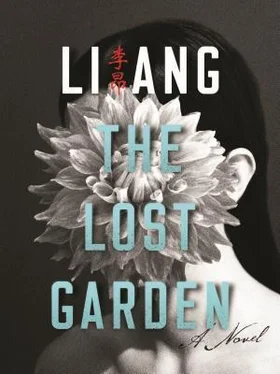From the surprised look in Lin’s eyes, she knew the moment they were introduced that she had caught his attention.
“Ah, the Lucheng Zhu family,” he said, following up with a name of an important figure in the financial world. “I think he’s your — elder uncle. I know him.”
She felt apprehensive. He obviously had some familiarity with her clan; she herself did not often get to see the elder uncle, an important figure in finance.
But she merely smiled and gracefully took her seat.
His youth and unexpected good looks surprised her. When he looked around, he had an arrogant, conceited expression, but his tall stature did make him stand out.
“You’re younger than I thought,” she said. He smiled indulgently, with obvious self-satisfaction. A hint of self-assurance graced the perfect outline of his lips, a sign that he had received more compliments than he could count. What should have followed was, “It’s unusual to be so accomplished at such a young age,” but instead, Yinghong continued in an off-handed manner:
“I’ve only read about you in the papers, and always thought you’d be a short, stocky businessman in his fifties or sixties.” She laughed at her own words. “And that you were connected with the underworld.”
She saw a subtle, shy look flit across his face; it was unquestionably a bashful look, no matter how quickly it faded. That stopped her.
Later they would, like many lovers, repeatedly return to when they first met. He would tease her about mentioning the underworld at their first encounter, and she would defend herself by saying that this was the impression she received from the news media, for he was a frequent subject for tabloid magazines, where he would be described this way:
REAL ESTATE TYCOON PLUCKS A STAR OUT OF THE FIRMAMENT
REAL ESTATE TYCOON ASSAULTED AT CONSTRUCTION SITE, TIES TO THE UNDERWORLD SUSPECTED
LIN XIGENG SPECULATES ON LAND, INCURS WRATH OF MAJOR INVESTMENT COMPANY
Along with the spurt of economic growth in Taiwan, the number of tabloid magazines also grew substantially; in any given month several would appear to embellish and propagate wondrous stories about individuals who had accumulated great riches in the export business. The salacious stories were told in an erotic and exaggerated tone to highlight the tycoons’ extravagances, including toilets made of gold in their houses, or how one was serviced simultaneously by a movie star and her mother, who was barely past prime.
Ever since Lin Xigeng was assaulted at a construction site, the magazine that claimed to have the inside scoop insisted that he had ties to the underworld, speculating that he had to have close relationships with local thugs to protect his massive enterprises, with construction sites all over the island. The magazine even offered a convincing analysis that his payoffs at every site each year were enough to support half of one particular gang, which was why he was on equal footing with the leader of that gang, which in turn made other gangs very unhappy.
At the time, a trade style unique to the island nation turned everything upside down and inside out; it was a time of anything goes and everything is possible. In an environment ripe for fanciful stories dealing with the underworld, a self-made man could become filthy rich almost overnight.
With the coquettish smile typical of a spoiled, naive girl, Yinghong repeated for Lin the gossip in a magazine, although, befitting her social status, she politely avoided the most sensational details.
Lin listened patiently, denying nothing, though with a perceptible show of shyness.
It was a banquet typical of Taipei businessmen, with one hostess per man, known as a “flower arrangement.”
The five or six girls that night all looked about the same — lightly made up, they did not appear to have come from the red-light district, trying hard to convince everyone that they were just ordinary women.
At five feet three or taller, they had big bones and wide hips, thick arms and tall bodies; undressed, they would still display a full figure. Obviously, the highest-earning among their peers, these women, with their large frames, satisfied the demand for “good figures” by local men who were usually not particularly tall or their more important clients — Japanese men engaged in sex tourism.
Naturally, they were all young, in their twenties, pretty but not beautiful. They wore ready-made clothes common in Taiwan, a bit too frilly for Yinghong’s taste, but in their view appropriate for evening wear. Some wore dresses with ruffled edges, some were in pencil skirts with side slits, and others had on layered-hem skirts that mimicked evening gowns. It was early spring, so not much flesh showed. Low waists with wide belts were in fashion, and, since the girls were large to begin with, six-inch-wide, bright, patent leather belts made them look even larger, their full-figured bodies overshadowing everything in sight.
They sat, absent-mindedly, nonchalantly, never taking the initiative to talk or strike up a conversation with anyone. The men ignored them as well. When Yinghong took her seat, she noticed nothing unusual, except that none of the women at the table were talking; she thought they were being neglected. Then she heard that the girl across from her was named Chen, so she greeted her politely and inquired:
“You’re so young. Should I call you Miss Chen or Mrs. Chen?”
With a languid, scornful smile, the girl answered lightly:
“You can call me Fangfang.”
What kind of woman would rather not use her family name? Yinghong wondered briefly before catching on.

Like so many lovers, they often talked about their first meeting. He loved to tease her in a tender, indulgent way, remarking how, as a woman who had seen the world, she could have mistaken professional hostesses as women from good families. Even ask the girl if she should call her Miss Chen or Mrs. Chen.
She would argue that they looked normal enough; they were just women. Later she realized that he enjoyed teasing her, for he obviously gained satisfaction from the fact that she was a pampered girl from a well-known family.
So she let him tease her, burying her face in his arms and pummeling him gently.

Like many typical banquets in Taipei’s business circles, dishes were brought out one after another, usually twelve in all. Liquor followed the food. The quiet girls sitting with the men now got into action, pouring drinks and offering toasts. Raising their glasses, they offered unvarying greetings:
“My name is Manling (or Meilan, or Nancy, or Wawa, or Ziyan). I’m pleased to meet and learn from you. May I ask your honorable name, Sir?”
The sirs gave them their names.
“Mr. Lin (or Mr. Wang, or Mr. Li, or Mr. Wu, or Mr. Zhu). Here’s to you.”
Glasses were raised.
They poured drinks, they served food, and they passed out towelettes, all in a ritualistic, repetitive manner.
My name is Meilan. Cheers, Mr. Wang. I’m pleased to meet and learn from you. (This hot pot is made with shredded bamboo and locally grown chicken. The clear broth goes especially well with the liquor.)
My name is Nancy. Cheers, Mr. Li. I’m pleased to meet and learn from you. (Waiter, we’re out of ice. Bring us some more.)
My name is Wawa. Cheers, Mr. Wu. I’m pleased to meet and learn from you. (Here’s some lemon, freshly squeezed, real lemon juice. Add some to your glass to prevent dry mouth at night.)
My name is Ziyan. Cheers, Mr. Zhu. I’m pleased to meet and learn from you. (Towels. Do we have hot towels? Bring us some hot towels, waiter.)
Читать дальше













